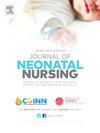Midwives as first responders: intervention outcomes for neonatal resuscitation in secondary health facilities, Oyo State, Nigeria
Q2 Nursing
引用次数: 0
Abstract
Introduction
Neonatal resuscitation is a critical skill for midwives, especially in secondary health facilities where the prevalence of asphyxiated newborns remains high. This study aimed to assess and enhance midwives' basic neonatal resuscitation skills through an intervention in secondary health facilities in Oyo State, Nigeria.
Methodology
A total of 22 midwives from 11 secondary health facilities were included in this intervention study. A convenience sampling technique was used to recruit respondents. Pre- and post-intervention assessments were conducted to evaluate the participants' skills in neonatal resuscitation using a checklist. Data were analyzed to compare the pre-and post-intervention skill levels using Statistical Package for Social Sciences version 25. Descriptive statistics (frequencies and percentages) and inferential statistics (Paired t-test) was used to test the hypotheses at .05 significance level.
Results
The study found that 50 % of participants were aged 41 years and above. Pre-intervention results showed that 86.4 % of midwives had below-average knowledge of neonatal resuscitation. After the intervention, 90.9 % demonstrated above-average skills. There was a significant difference between pre and post-intervention skills of neonatal resuscitation (P = 0.000).
Conclusion
The study demonstrates that targeted training can effectively enhance the neonatal resuscitation skills of midwives in secondary health facilities. Continuous professional development and tailored training frameworks are essential for improving the quality of neonatal care and reducing neonatal morbidity and mortality.
助产士作为第一响应者:尼日利亚奥约州二级卫生机构新生儿复苏的干预结果
新生儿复苏是助产士的一项关键技能,特别是在新生儿窒息率仍然很高的二级卫生机构。本研究旨在通过对尼日利亚奥约州二级卫生机构的干预,评估和提高助产士的新生儿复苏基本技能。方法本次干预研究共纳入了来自11个二级卫生机构的22名助产士。采用方便抽样方法进行调查。使用检查表进行干预前和干预后评估,以评估参与者在新生儿复苏方面的技能。使用社会科学统计软件包第25版对数据进行分析,比较干预前后的技能水平。采用描述性统计(频率和百分比)和推理统计(配对t检验)在0.05显著性水平上检验假设。结果研究发现,50%的参与者年龄在41岁及以上。干预前结果显示,86.4%的助产士对新生儿复苏的了解低于平均水平。干预后,90.9%的人表现出高于平均水平的技能。干预前后新生儿复苏技能差异有统计学意义(P = 0.000)。结论针对性培训能有效提高二级卫生机构助产士的新生儿复苏技能。持续的专业发展和量身定制的培训框架对于提高新生儿护理质量和降低新生儿发病率和死亡率至关重要。
本文章由计算机程序翻译,如有差异,请以英文原文为准。
求助全文
约1分钟内获得全文
求助全文
来源期刊

Journal of Neonatal Nursing
Nursing-Pediatrics
CiteScore
2.00
自引率
0.00%
发文量
143
期刊介绍:
Aims & Scope: This is the practical, bimonthly, research-based journal for all professionals concerned with the care of neonates and their families, both in hospital and the community. It aims to support the development of the essential practice, management, education and health promotion skills required by these professionals. The JNN will provide a forum for the exchange of ideas and information between the range of professionals working in this field; promote cooperation between these professionals; facilitate partnership care with families; provide information and informed opinion; promote innovation and change in the care of neonates and their families; and provide an education resource for this important rapidly developing field.
 求助内容:
求助内容: 应助结果提醒方式:
应助结果提醒方式:


